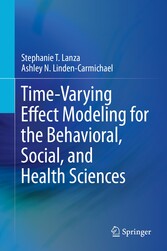This book is the first to introduce applied behavioral, social, and health sciences researchers to a new analytic method, the time-varying effect model (TVEM). It details how TVEM may be used to advance research on developmental and dynamic processes by examining how associations between variables change across time. The book describes how TVEM is a direct and intuitive extension of standard linear regression; whereas standard linear regression coefficients are static estimates that do not change with time, TVEM coefficients are allowed to change as continuous functions of real time, including developmental age, historical time, time of day, days since an event, and so forth.
The book introduces readers to new research questions that can be addressed by applying TVEM in their research. Readers gain the practical skills necessary for specifying a wide variety of time-varying effect models, including those with continuous, binary, and count outcomes. The book presents technical details of TVEM estimation and three novel empirical studies focused on developmental questions using TVEM to estimate age-varying effects, historical shifts in behavior and attitudes, and real-time changes across days relative to an event. The volume provides a walkthrough of the process for conducting each of these studies, presenting decisions that were made, and offering sufficient detail so that readers may embark on similar studies in their own research. The book concludes with comments about additional uses of TVEM in applied research as well as software considerations and future directions. Throughout the book, proper interpretation of the output provided by TVEM is emphasized.
Time-Varying Effect Modeling for the Behavioral, Social, and Health Sciences is an essential resource for researchers, clinicians/practitioners as well as graduate students in developmental psychology, public health, statistics and methodology for the social, behavioral, developmental, and public health sciences.
Stephanie T. Lanza, Ph.D., is the C. Eugene Bennett Chair in Prevention Research, Director of the Edna Bennett Pierce Prevention Research Center, Director of the Consortium to Combat Substance Abuse, and Professor of Biobehavioral Health and Human Development. She works primarily in two methodological areas. Much of her work seeks to advance finite mixture models, particularly latent class analysis. She also works to advance and apply new statistical models in order to reveal dynamic processes, focusing on time-varying effect modeling to address new research questions related to health behaviors. For more information about Dr. Lanza, visit https://aimlab.psu.edu/people/stephanie-lanza/
Ashley N. Linden-Carmichael, Ph.D., is an Assistant Research Professor in the College of Health and Human Development and the Edna Bennett Pierce Prevention Research Center. Her program of research focuses on identifying influential and underlying psychosocial predictors and consequences of high-risk drinking behavior and substance co-use. Ashley has a particular interest in using innovative methods, such as daily diary designs, ecological momentary assessment, and wearable alcohol sensors to assess problematic alcohol use patterns in real-time. For more information about Dr. Linden-Carmichael, visit https://aimlab.psu.edu/people/ashley-linden-carmichael/











